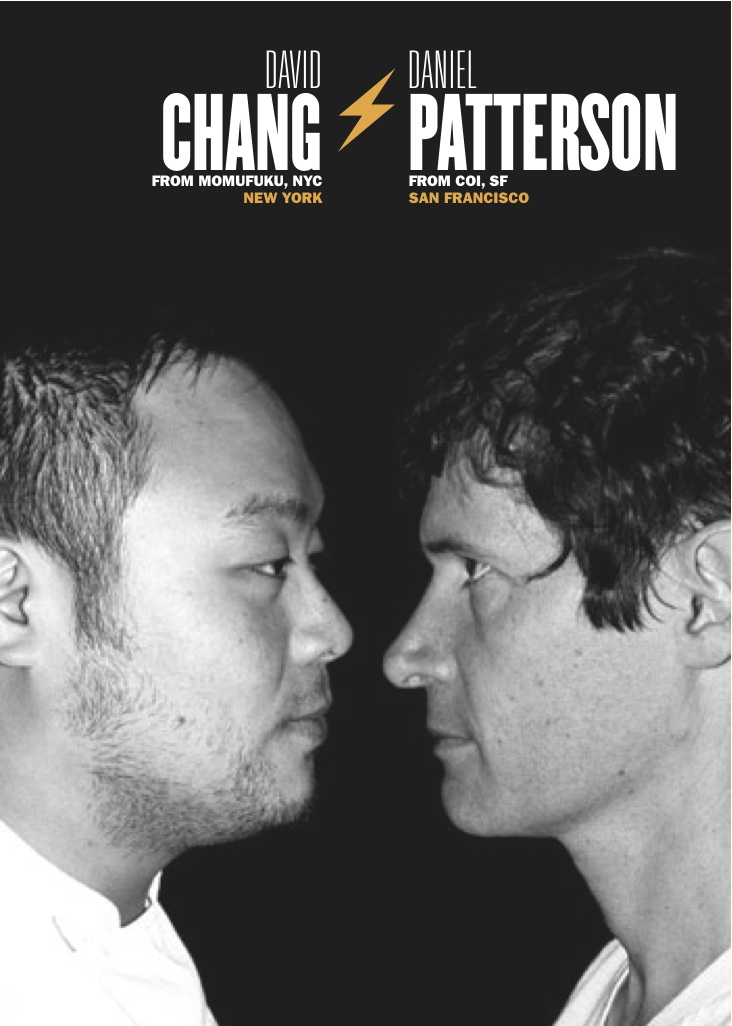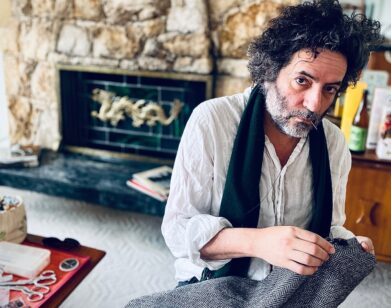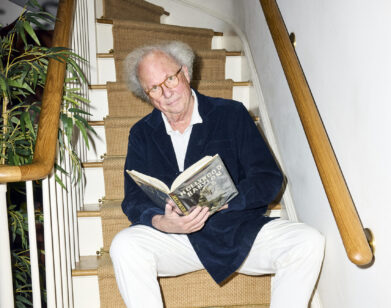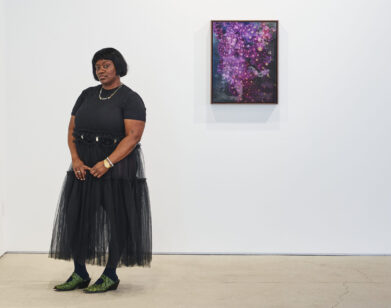Museum as Kitchen: Le Fooding

Born of the frustration of that journalists Alexandre Cammas and Emmanuel Rubin felt with the conservatism of French food culture, Le Fooding has been fighting for gastronomic freedom for 10 years. With an annual tell-it-like-it-is restaurant guide (for which critics pay their own checks on meals) and festival picnics, “Fooding”—a cross between “food” and “feeling”—has become a beacon of young-hearted fun in a very traditional culinary field. This week’s Le Grand Fooding features a face-off between New York and San Franciscan chefs—among them Momufuku’s David Chang and Blue Hills’ Dan Barber—in no less than the hallowed halls of MoMA PS1.
We sat down with co-organizer Alexandre Cammas on the eve of the showdown to discuss the importance of food in New York, and how a kitchen is like a boxing ring.
ARIELLA GOGOL: How did you come up with the concept of Le Fooding?
ALEXANDRE CAMMAS: Only in cuisine, due to guides like the Michelin, are we interested solely in haute cuisine. Bourgeoise cuisine was replaced by nouvelle cuisine, which was replaced by cuisine moleculaire...
GOGOL: Why did you decide to bring Le Fooding to the US?
CAMMAS: New York is not a city, it’s an unending film, with a decor that is unique in the world. When we asked where we should celebrate our tenth anniversary, the conclusion was immediate. We arrived, ate a lot, drank a lot, listened a lot, and we decided that it would be possible. Here, like in Paris, the classical restaurant system is in the process of being shattered—bistrots of grands chefs francais open without passion, and are being replaced by wonderful, smaller, restaurants, especially in Brooklyn. Manhattan has also great star chefs without “stars,” who have returned to the essential: the quality of the product. This was the ideal for us.
GOGOL: Is France experiencing the same level of food-trendiness as America is, with shows like Top Chef, and the popularity of so many foodie blogs?
CAMMAS: France has rediscovered little by little that it loves to eat, dine, and enjoy restaurants without over-thinking it. In a certain way, France has regained that which an elite gastronomy took from it when it established an elite culture of cuisine, inaccessible to anyone who doesn’t know how to taste a grand Bordeaux and smoke a grand cigar. Everything but this trendiness, with the exception of a few French inventions like the néobistrot, caves à manger, or more directly, the Le Fooding events, is still timid. For example, the concepts of TV shows are copies of foreign concepts, taken as original. The same for book publishing. And we have no daily newspaper in France as sharp about these matters as the New York Times, by example, can be.
GOGOL: Do chefs really engage in the kind of “shit talking” that is shown in the website’s interview? Or is that just to rile up excitement?
CAMMAS: I think that the response lies in-between. To begin, it’s a wink to press conferences before a boxing match. But I have noticed that as we approach the event, there is a perceptible tension, especially among the “visitors,” for whom the challenge is the most difficult—in the sense that they are not cooking in their own kitchens, they’re without their suppliers’ products. We feel that they do not want to get it wrong. In addition, in San Francisco, there are really two schools: that of chefs firmly on the side of, “fig on the plate,” and those that, conscious of this force/fable, have decided to invent a more personal reputation. One that wants to say that the idea of regional or national cuisine is clearly being shattered and replaced by cuisines d’auteur.
GOGOL: What city do you think has the best food right now?
CAMMAS: New Yorkers, for example, like to live in the moment. They search for immediate pleasure… this is the reason why their cuisine is rich in flavor. It makes the cuisine more accessible and agreeable for the comund des mortels. In Paris, even if the chefs cook less and less for the brain and more and more to see their clients smile in the moment, certain chefs’ cuisine still demands that we tame it, that we read in between the lines or between the teeth of the fork. In San Francisco as well, we ask for greater efforts in certain restaurants. The “enjoyment” is not an immediate obligation. In Milan, where popular Italian cuisine dazzles only the tourists, chefs aim to surprise, and again chase those stars.
GOGOL: Do French chefs know something American chefs don’t?
CAMMAS: They are different, they do not look to achieve the same objectives to please (or the highest response). They can both feels different complexes and mutually inspire. In Paris, there is not an equivalent to David Chang; and in New York, there are French bistros, but there are much fewer bistros d’auteur, which rule Paris.
GOGOL: What are your ambitions for Le Fooding? Do you believe that Le Fooding promotes, in the words of The New Yorker, a “culinary futurism”?
CAMMAS: I am not sure. I am radically opposed to the notion of futurism that was introduced in the fascist years in Italy, condemning the rules to impose others in the name of relative “modernity.” The idea is above all that the spirit of liberty, tolerance, love of difference, that inspires and animates Le Fooding, continues to breathe and grow in a world where church quarrels still resonate. Adding a bit of humor, cool, sens de la fête, no matter the universe or serious discipline, can only do good. As to the title, our ambitions have always been defined by our desires.
GOGOL: Why did Emmanuel leave on account of a loss of “moral mission”? What do you consider the movement’s mission to be?
CAMMAS: Emmanuel regrets his comments in the New York Times. He did not quit Le Fooding… I asked him to leave, which is slightly different. This happened over a difficult period of his life, when he was not animated by this anymore. Regarding the “moral mission,” ask Action Against Hunger (ACF-International), who benefits from our New York event if what we are doing for them is “immoral.” And of course Le Fooding is happy to have such strong sponsors like Veuve Clicquot and S. Pellegrino! Without them, the event wouldn’t be possible. And Dan the Automator, Grizzli Bear, Matali Crasset, Dan Barber and Mourad Lahlou would not all appear in a program for the same night.
LE GRAND FOODING TAKES PLACE AT MOMA PS1, SEPTEMBER 24–25.






